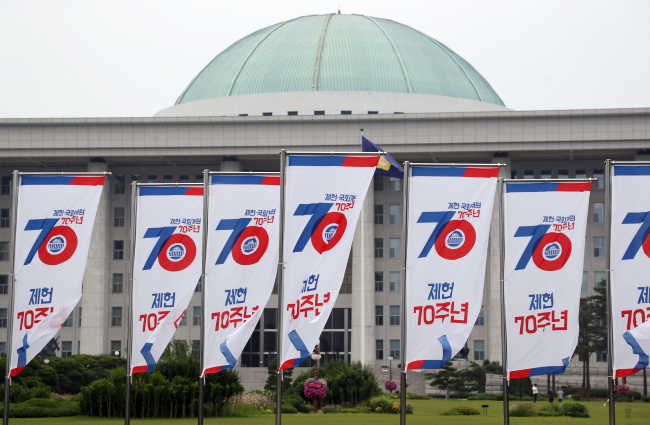Parliament's normalization delayed as opposition parties grapple with election defeat
By YonhapPublished : June 19, 2018 - 16:40
South Korea's parliament has shown no sign of normalizing its operation as opposition parties have been grappling with the fallout of last week's huge election defeat.
The National Assembly's extraordinary session in June may end without even holding a plenary session as rival parties have yet to start discussions to form standing committees, a process needed for the parliament's operation in the second half of its four-year term.
Former parliamentary speaker Chung Sye-kyun's two-year term ended in late May, but parties failed to even start work to pick his successor and form the 18 standing committees as they focused on campaigning for June 13 local elections.
But the main opposition Liberty Korea Party and other minor opposition parties suffered humiliating defeats in the elections, leaving them bent on handling the post-election situation.

The LKP said that its priority is on resolving internal strife driven by its election defeat. The minor opposition Bareunmirae Party plans to select a new floor leader next week as its two co-chiefs and other senior officials stepped down.
The ruling Democratic Party, which won a sweeping victory in the elections, called for opposition parties' cooperation to normalize the National Assembly.
The governing DP appears to have set July 17, or Constitution Day, as the deadline by which the parliament should be fully back on track.
If a new parliamentary speaker is not elected by then, Suh Chung-won, an eight-term LKP lawmaker, could deliver a speech to mark the 70th Constitution Day as acting speaker.
Under law, a lawmaker who has been elected the most times can serve as acting parliamentary speaker in the absence of a new speaker.
"It is worrisome that the National Assembly could not be normalized until (Constitution Day), which laid the groundwork for democracy and public sovereignty," Hong Young-pyo, the DP's floor leader, said.
"The LKP might have its own difficulties, but parliamentary normalization is a different issue," Hong said. "There should be no more vacuum in the National Assembly."
The ruling DP said that the parliament needs to keep pace with the international community's efforts to denuclearize North Korea and bring peace to the Korean Peninsula.
In May, the National Assembly failed to adopt a resolution to support the April inter-Korean summit as rival parties differed on the wording on North Korea's denuclearization.
They have yet to even exchange opinions about a possible parliamentary ratification of the so-called Panmunjeom Declaration, an agreement adopted after the April summit between President Moon Jae-in and North Korean leader Kim Jong-un.
But in a positive sign, the centralist Bareunmirae Party and the liberal minor opposition Party for Democracy and Peace remained committed to negotiations to set up parliamentary committees.
The Bareunmirae Party has proposed to the DP and LKP that elections to pick standing committees chiefs could be delayed to early July after parties reach an agreement on broad allocations of the parliamentary chairmanship and committee leaders.
"To discuss people's day-to-day issues, we should swiftly form the parliamentary committees," Cho Bae-sook, the chairwoman of the Party for Democracy and Peace, said Monday. (Yonhap)



![[Herald Interview] 'Amid aging population, Korea to invite more young professionals from overseas'](http://res.heraldm.com/phpwas/restmb_idxmake.php?idx=644&simg=/content/image/2024/04/24/20240424050844_0.jpg&u=20240424200058)














![[KH Explains] Korean shipbuilding stocks rally: Real growth or bubble?](http://res.heraldm.com/phpwas/restmb_idxmake.php?idx=652&simg=/content/image/2024/04/25/20240425050656_0.jpg&u=)

